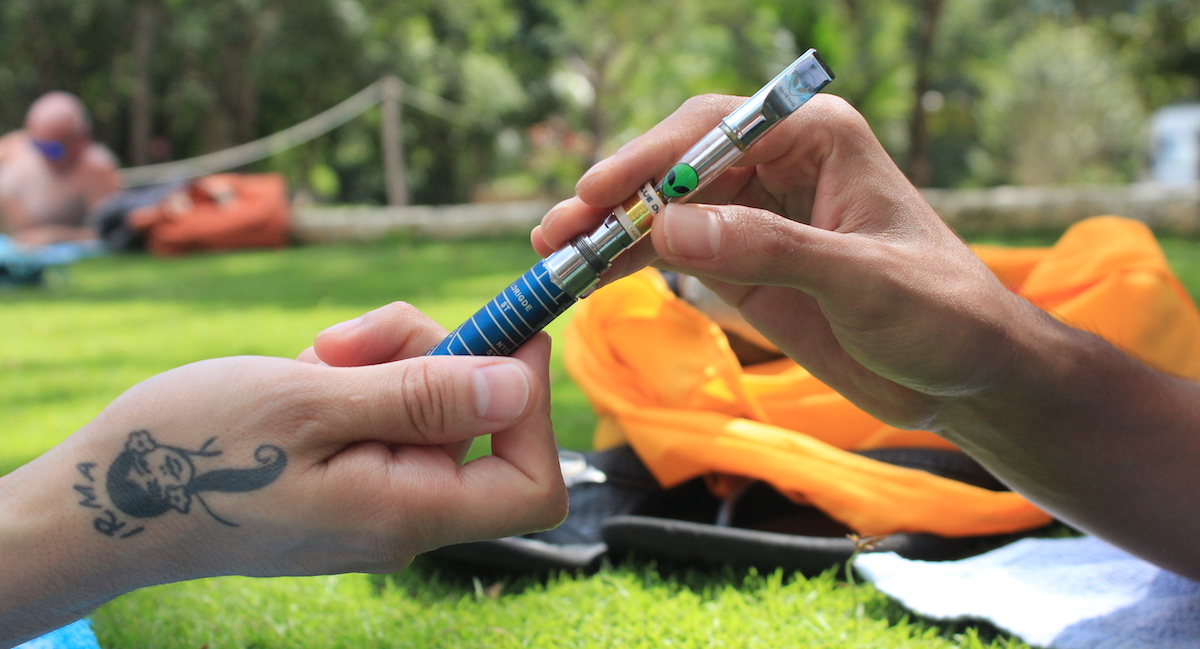Last night, US voters proved the one thing they could agree on was the end of drug prohibition. Detouring around politicians’ inaction on the issue, 100% of statewide cannabis ballot measures passed, from Arizona to Mississippi. Oregon became the first state to decriminalize small amounts of most drugs, shifting budget from law enforcement to addiction treatment programs in the process—and not to mention, joining Washington DC in legalizing medicinal mushrooms.
As ever it has been, drugs are winning the War on Drugs.
This all took place while two elderly white men battled it out for an as-yet-undecided stint in the White House. Cannabis legalization may not have qualified as a base-riling issue for Donald Trump, but Joe Biden and his ailing Democratic Party would have done well to pay attention to voters’ dissatisfaction with drug prohibition.
Their failure to do so underlines the disconnect between us and our elected officials on this point. In fact, in a press release sent out last night NORML’s executive director Erik Altieri called politicians’ reluctance to support cannabis reform as a “dereliction of representation.”
Four states including New Jersey, Arizona, and Montana legalized recreational marijuana last night. Mississippi regulated medicinal cannabis. In South Dakota, voters passed not one, but two plans to legalize the drug. That state’s Constitutional Amendment A puts rather stringent limitations on recreational use; personal possession of up to an ounce and the permission for each adult to grow up to three plants in their home. South Dakota’s medicinal weed-regulating Measure 26 legalized licensed patient possession and home grows, in addition to a government-run retail system for medicinal users.
Oregon proved to be the country’s fall election progressive closer by passing Measure 110 to become the first state to decriminalize possession of drugs including cocaine, heroin, oxycodone, and methamphetamine. That initiative also shifted the state’s view of substance addiction from a law and order issue to a matter of public health, redirecting police funds into treatment programs. The state’s Measure 109 authorized health professionals to administer medicinal magic mushrooms—the decriminalized possession of which 77 percent of Washington DC voters agreed with. DC went even further by authorizing the legal possession of the wider category of entheogenic (read: psychedelic) plants.
What lessons will our political parties take from this citizen consensus on drug reform? At the moment, high levels of nothing. Despite VP nominee Kamala Harris’ laudable evolution towards supporting cannabis legalization, Biden clings to his decriminalization-only posture, citing a lack of science on marijuana’s health effects.
Trump has maintained a more slippery perspective on cannabis, having legalized hemp by signing the 2018 US Farm Bill, and making noise in the past about supporting drug reform on a state level. Those scattershot mutterings, however, have been rendered all but meaningless by his appointment of anti-pot Attorney General William Barr and by deploying his administration to bar immigrants from naturalization if they are caught working in the legal marijuana industry.
As we wait for our elected officials to catch up to public opinion, and by extension, for federal legalization, up north, massive Canadian cannabis corporations consolidate their market share and even mastermind marijuana’s neoliberal era by snapping up Latin American cannabis business licenses. In Mexico, even as the Senate’s December deadline from the Supreme Court to regulate recreational cannabis looms, the government uses the cover of the Drug War to obscure massacres and widespread kidnappings—terror tactics uncannily echoed in the mass incarceration of US communities of color.
Right—because most importantly when it comes to the reasons for cannabis legalization in this country is the fact that Black and Brown people continue to sit in jail for non-violent drug offenses. Regulation is only the first step towards fixing this gross injustice—current data from legalized states points to the persistency of racism in the regulated cannabis industry. BIPOC-led efforts to combat that structural deficiency, however, have gathered steam in the wake of this summer’s surge in the movement to center Black lives.
Last night, cannabis legalization proved to be more popular than any party or indeed, any other current political topic football being kicked around. In a country so deeply divided that the prospect of civil war seems entirely feasible, we need to look at how drug reform popularity has coalesced. It’s not about the right to get stoned, but rather our responsibility to dismantle mechanisms of inequality and social control. A no-brainer—at least, voters think so. The campaign starts now. Weed for the White House in 2024.



